EGGS! They are one of the most versatile, delicious, and nutritious cooking ingredients which we all take for granted. You probably won’t give it a second thought until there is a shortage of it like what happened during the Malaysian egg ban of 2004. Suddenly, your char kway teow and Hokkien mee doesn’t taste right, your kopi and kaya toast set is missing something and there doesn’t seem to be any cakes around!
Singapore currently produces almost 30% of the eggs we need. The majority of the rest comes from Malaysia and every now and again, there is the threat that our neighbour might restrict exports due to a shortage. To avoid shortages, we are now also importing eggs from other countries such as New Zealand, Thailand, Japan, and Australia but it is still important for us to be able to produce our own eggs!
Seng Choon Farms operates one of the largest egg farms in Singapore and it is still very much a family-run business. Visiting the farm was an eye-opener for us as we would never have imagined that they had the capacity to house 800,000 chickens and produce more than 600,000 eggs every day!
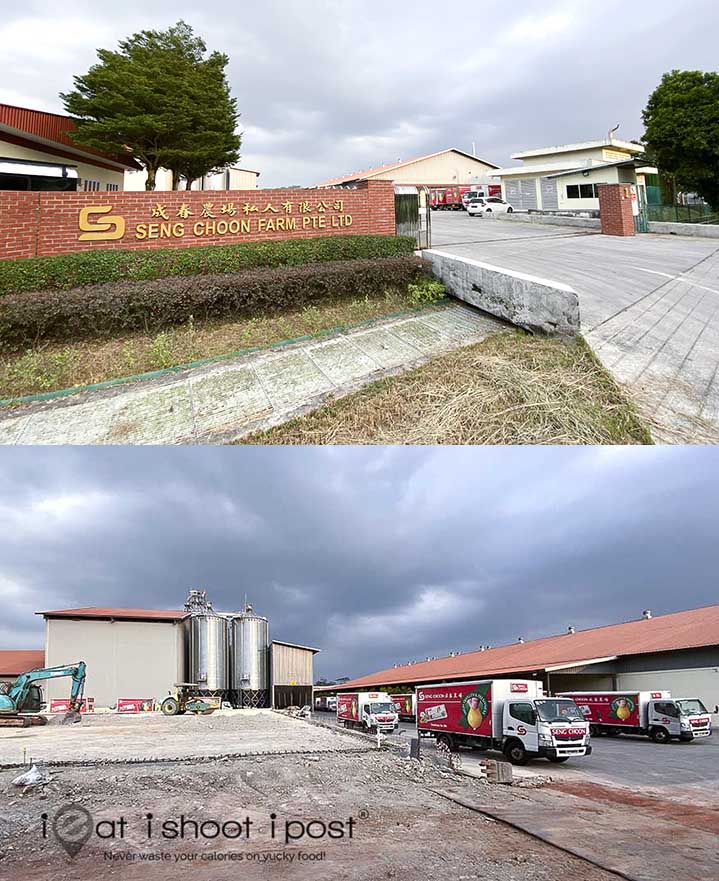
After passing through the main gate the first thing that greets you is the feed house with its silos where corn and soybeans are stored. The feed house is where the chicken feed is prepared and then delivered to the chicken houses via conveyor belts.
From Chicks to Hens
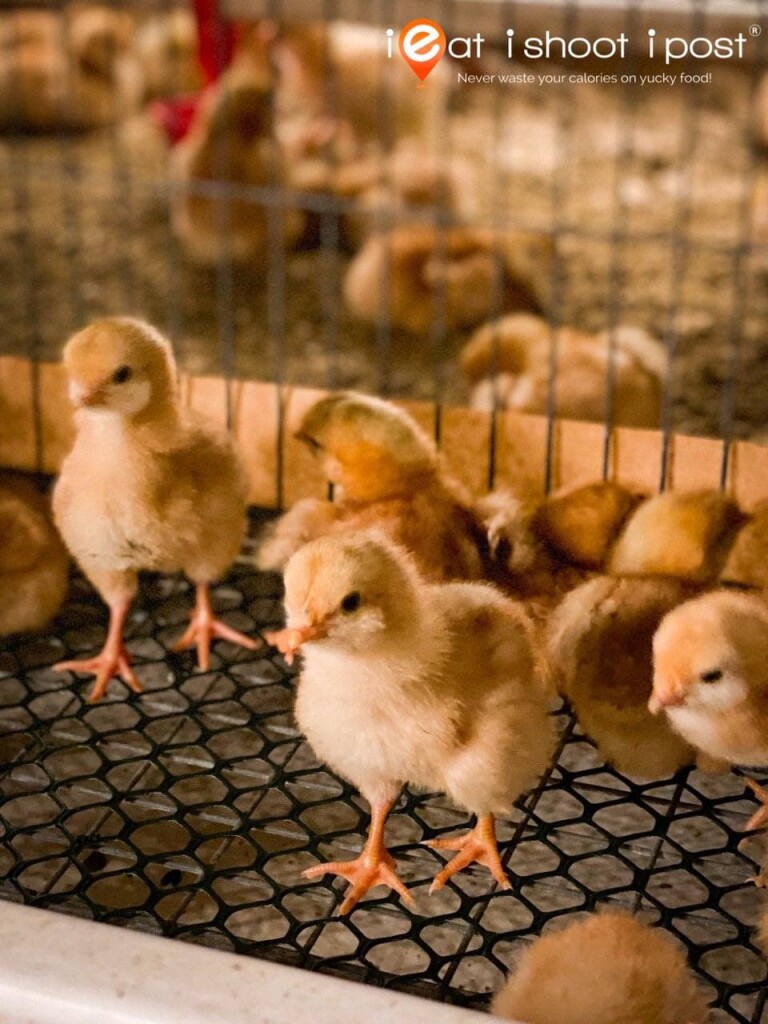
So, which came first? The chicken or the egg?
Well, at Seng Choon Farm at least, the answer is the chicken!
Day-old chicks are first imported from other countries and reared in what they call “grower houses” until they are 16 weeks old before being transferred to the “layer houses”.
The cages have little feeders with water infused with nutrients across the cage which are adjusted to the height of the chicks as they grow. The chicks are later separated to different cages as they grow bigger to allow for more room to move around.
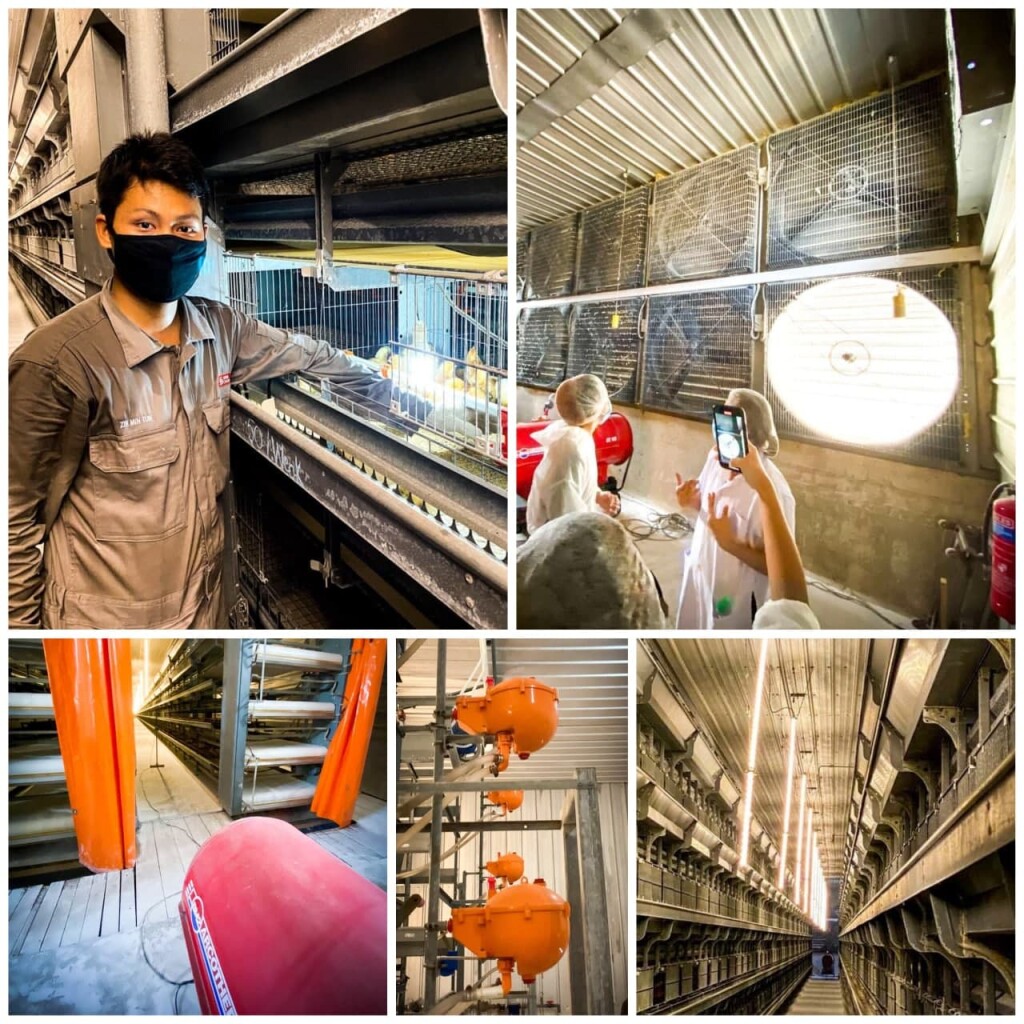
Because little chicks develop best at 30 degrees Celsius, they have heaters to keep ensure that the chicks are growing in optimum conditions. In case of a power shortage, back-up generators kick in to maintain the warm temperature. Diurnal rhythm is regulated by LED lights turn on and off to simulate day and night.
Bio-security is taken very seriously at Seng Choon farm. Workers managing the grower house are not allowed to enter the other hen houses and vice versa. So, for example, Lisa who visited the grower house was not allowed to enter the hen house.
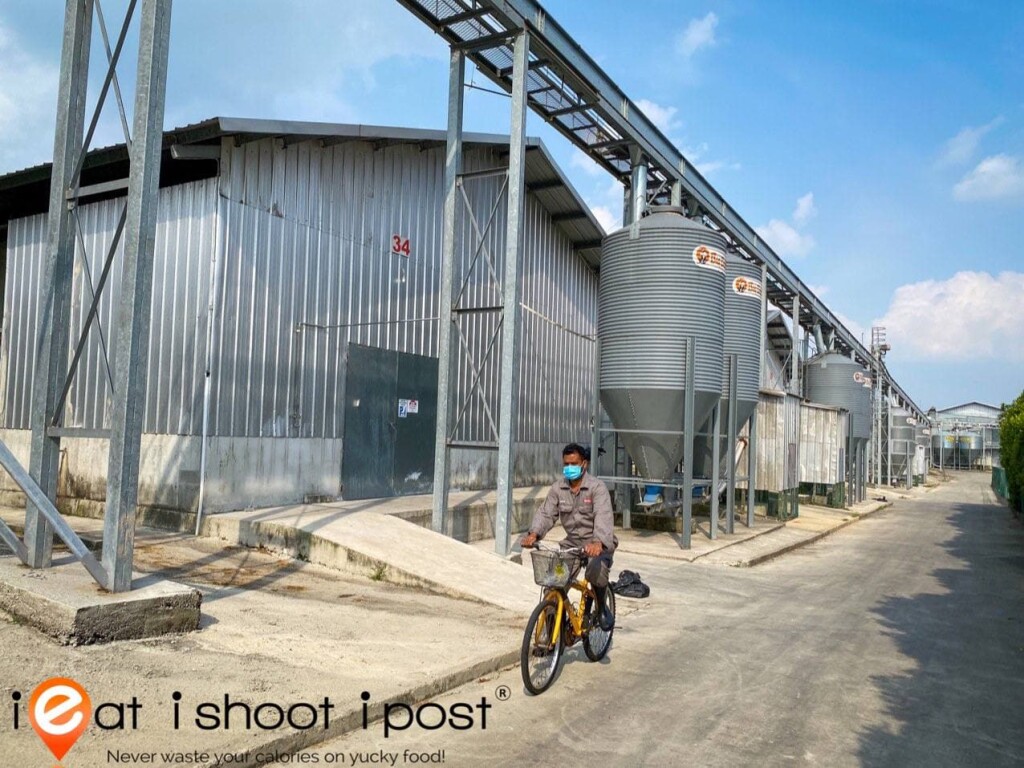
While it was so fun to see the cute little chicks, Lisa couldn’t wait to get out of the place and when finally did, the normally warm and humid Singapore air felt like a blast of cold air from an air-conditioner!
Egg Production (Where the Chicken Lay Eggs)
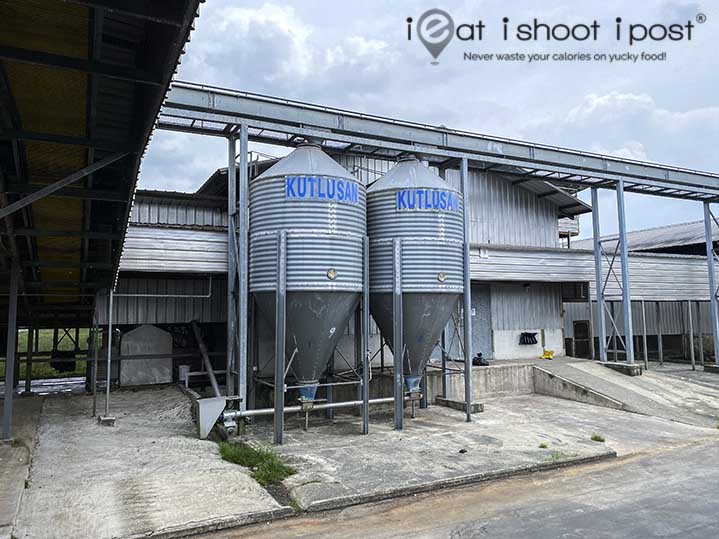
Once the chicks are 16 weeks old, they are transferred to the “layer houses” where they will spend the next two years laying eggs. The eggs laid from the young hens tend to be smaller and are traditionally regarded as more nutritious and delectable. These are sold under the label of “1st Born Eggs”. By around 20 weeks the hens start laying the standard size eggs and as they age, the eggs will tend to get larger. Each hen will lay approximately one egg per day and will produce around 600 eggs in 2 years after which they will be sold as “old mother hens”.
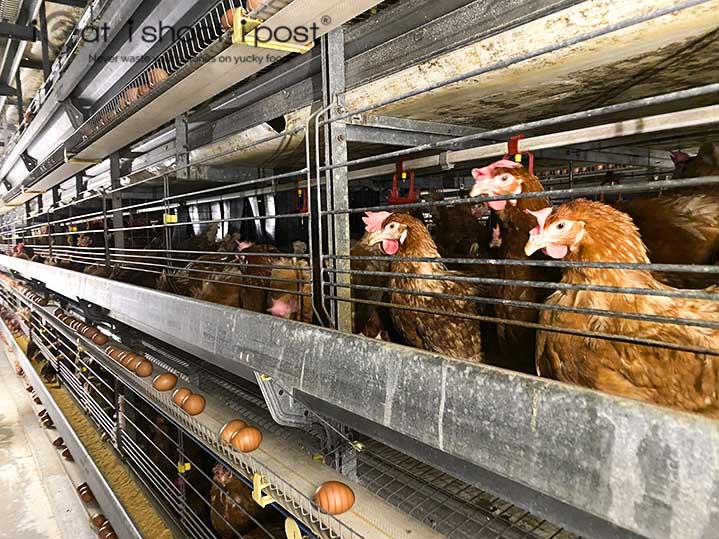
The chickens are fed five times a day with the feed that is automatically dispensed by machines. Eggs of different nutritional compositions are produced by altering the composition of the feed. “Farm 3 Eggs” for example which are high in Omega 3 and 6 are fed with fish oils whereas “Carrot eggs” come from hens fed with cornmeal enhanced with carotene. One ingredient that is added in all the feed is calcium to ensure the hens lay eggs with stronger and thicker shells!
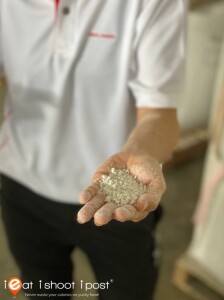
What I found most surprising is how clean the freshly laid eggs are! In fact, most of them look exactly like how it looks sitting in the carton of the supermarket shelves. As we will learn later, this is exactly what we get when we open a carton of eggs!
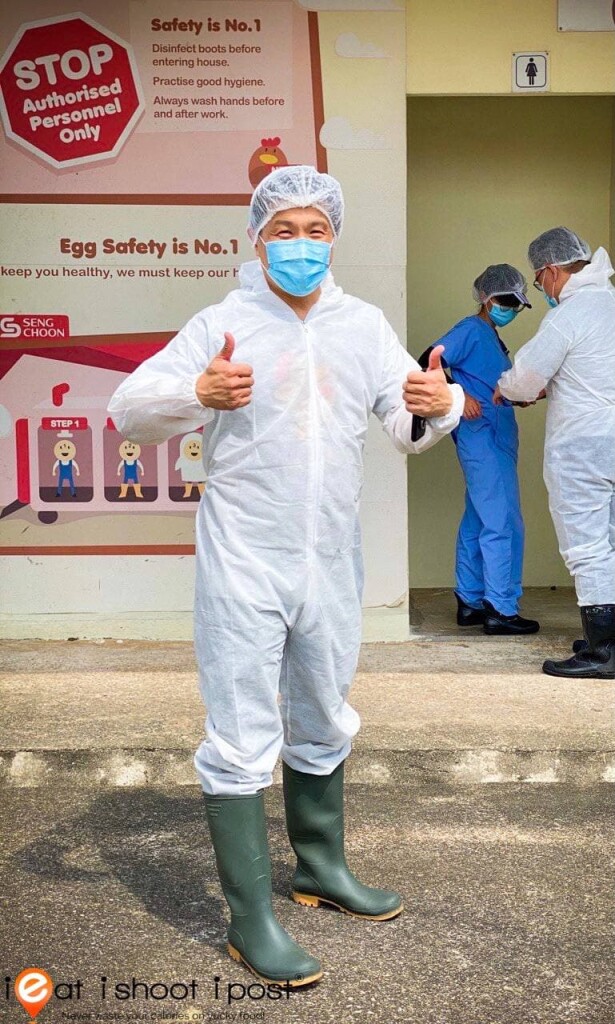
Keeping the Chickens healthy is the key in ensuring that the eggs are safe for consumption.
Salmonella poisoning is always a threat when it comes to eggs and so everything is done to ensure that the eggs are free from Salmonella. To do this the chicks are first vaccinated and then housed in separate batches. The chicken houses are thoroughly disinfected after each batch has gone through its natural life cycle.
Before we were able to enter the chicken houses, we had to:
1. Bathe and change our clothes
2. Don full-body suits, hair net, masks, gloves, and boots provided by Seng Choon
3. Be sprayed with disinfectant as we enter the restricted area
4. Have our boots disinfected
All these procedures ensure that the chicken houses remain Salmonella-free.
The Packing Process
Once the eggs are laid, they gently roll down the bottom of the cage onto a conveyer belt which delivers them to the packing room where they are inspected, cleaned, sorted and packed.
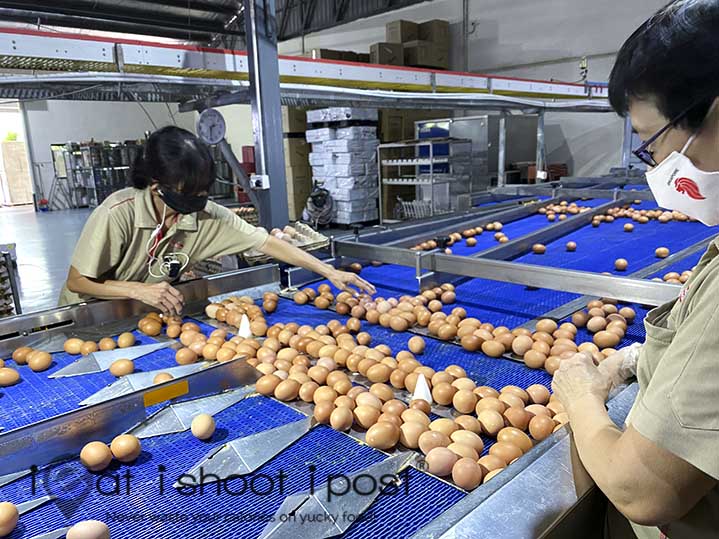
The eggs still have to go manual inspection by workers who would look out for damage missed by the automated process, like the top and bottom of the egg. The eggs are then oriented so that the pointed end faces down when packed. The reason they need to be packed this way is to ensure that the air bubble in the egg remains at the top. If they were packed with the rounded end at the bottom, the air bubble will rise which may contaminate the yolk.
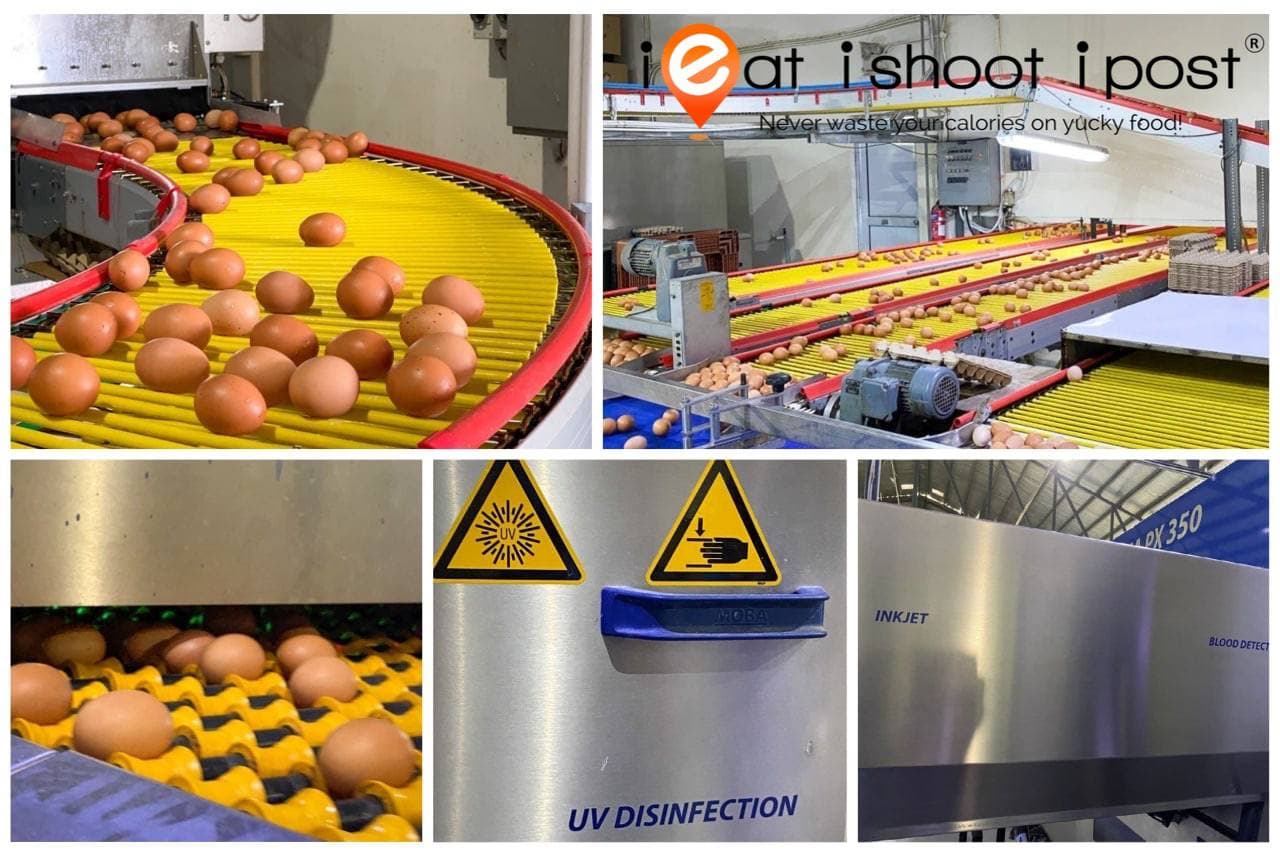
Next, the eggs go for UV disinfection which kills any germs present on the outer surface of the eggs. Finally the eggs are weighed and (ink jet) stamped with a code that allows the farm to trace any egg to the production batch and chicken house!
To wash or Not to wash? That is the question
Do you know that eggs should not be washed because there is a natural protective layer on the surface of shell? Once washed, this layer is removed and bacteria and other contaminant can enter the egg. Hence, it is better to wash your eggs just before you use them. At the farm, only dirty eggs are washed and only at controlled temperatures and with food safe sanitizer. The eggs are also oiled after washing so that they can keep longer.
From Hen House to RedMart Warehouse
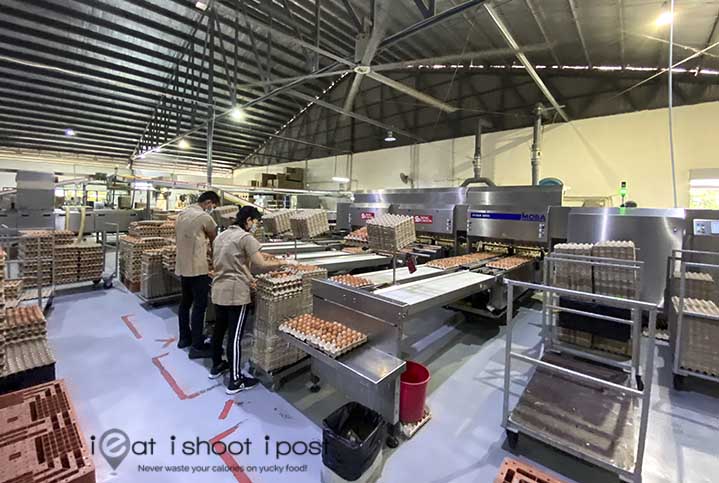
You’ll be glad to know that Seng Choon Farm eggs typically reach RedMart warehouse within a day of being laid! At the warehouse, the eggs are refrigerated as that is the best way to store eggs! That explains why the eggs you receive from RedMart usually come chilled. Remember to always store your eggs in the fridge as it helps to preserve the freshness of the egg and retards any microbial growth present.
EGG RECIPE: Poached Eggs with Shio Konbu and Truffle oil on Avocado Toast!
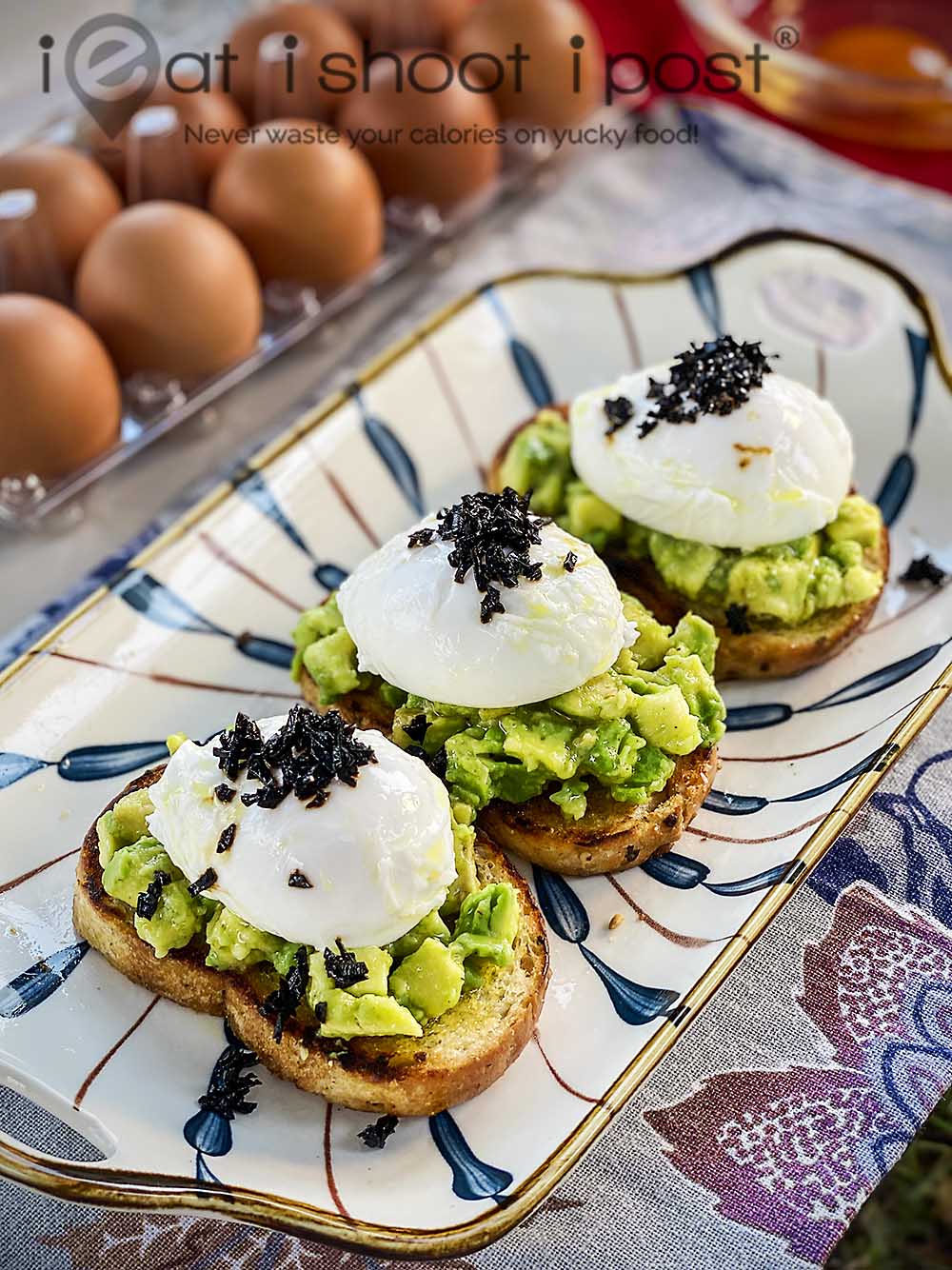
When eggs are super fresh, there is a good amount of the thick albumen which is essential for making great poached eggs. Since we are at the farm itself, the eggs can’t get any fresher and the best thing to make are poached eggs.
Here is a tip for how to work out how fresh your Seng Choon eggs are. Just look at the “best before” date and subtract 25 days from it and you will know roughly when the eggs are laid! If you use fresh eggs which are a few days old, your poach eggs will come out perfect! As the egg ages, the proportion of thin to thick albumen increases and when you poach the egg, you may find tha the whites simply dissipates into the water instead of congealing into a nice cushion over the yolk.
My method of making poached eggs is very simple.
1. Crack the eggs onto the sieve to drain out the thin white, then add the eggs into a bowl with half a cup of water. You can add more eggs into the same bowl. The water will help to keep the eggs separate and make it easy to slide all the eggs into the water.
2. Heat the water till it is barely simmering (about 85°C). Add a tablespoon of vinegar to the water and give it a swirl to get a current going.
3. Now simply slide all the eggs into the water.
4. Keep swirling the water until the whites are firmed up, (about 2 mins) and then take the eggs out after another 1 to 2 mins and place them into cold water to stop the cooking process.
5. Serve the poached eggs over avocado and toasted bread. Drizzle some truffle oil and chopped shio konbu.
Ingredients
– Seng Choon Farm Eggs
– Truffle Oil
– Shio Konbu
– Avacado
– Country Bread (for toast)
Click here for more Egg Recipes.

Conclusion
We like to thank Seng Choon farm for their hospitality and generous sharing of knowledge! It was truly an enriching and pleasant farm visit. Locally produced eggs may be slightly more expensive but they are really fresh and we can be assured of the quality. So next time you order your eggs, do remember to support local producers!
Do check out other recipes using ingredients available on RedMart:
Tea-smoked Salmon recipe
Steak with Mushroom sauce
Crispy Chicken with Colonial Curry Sauce
Sweet and Sour Pork Recipe
Mapo Tofu Recipe
Also read about: RedMart supplier stories
Red Dot Farm – high tech veggie farm
BluCurrent – smart fish farm
EGGS Q&A
Thank you to all readers who submitted your egg questions. Below are answers to all your questions and to the Eggtelligent Quiz! If you’ve missed taking the Eggtelligent quiz, click here to test your egg knowledge to see if you are an egghead, eggspert, just eggverage or simply eggnorant!
GENERAL
Q: Why aren’t there any duck eggs in Singapore?
A: SFA requires that ducks be farmed in an environment that restricts contact with other birds. So far, there haven’t been any farms that satisfy the criteria.
REARING
Q: What do they do with male chicks?
A: Male Chicks are humanely euthanised.
[In Germany, “Ovo-sexing” has been adopted, where sex is determined at day 9. To decide whether the chick is to be incubated (female) or raising the chicken for meat (male). However, this is quite an expensive process and takes a toll on the environment. Since male chicks take a much longer time to grow compared to broilers, it will consume even more resources, while producing very little yield.]
Q: How does Seng Choon ensure their chickens are treated humanely?
A: To ensure Seng Choon chickens are treated humanely, they:
- Have an on-farm veterinarian who monitors the health of the hens closely and trains other staff on proper handling and care of birds
- Give the birds an unrestricted supply of:
- Unpolluted fresh air
- Unrestricted access to potable water
- Unlimited provision of wholesome nutritionally balanced foods
- Keep the hen houses at a moderated temperature
- Exclude predators to prevent injury and minimize aggression
Q: Do chickens know and/or do they get angry when they see their laid eggs get taken away?
A: Most do not bother unless broodiness (tendency to incubate the eggs) sets in, then they may peck at you. However, since the eggs are not fertilised, there is no need for incubation. Thus, this will only happen if the eggs are lying around too long in the sheds.
Q: Is it possible to produce more white eggs? Since a report shows that chickens laying white eggs are less aggressive
A: Brown birds are more productive and when they are housed in comfortable conditions, there is not much aggression in the cages.
EGG YOLKS
Q: Can Singaporean egg farmers start producing / make orange yolk eggs more readily available?
A: Seng Choon produces Carrot eggs which are more orangey due to the carotene in the feed.
Q: Can the colour of the yolk be “engineered” by the chicken feed or artificial colouring?
A: Yes.
Q: Why do different egg yolks have different colours?
A: Depends on what the chickens eat.
Q: Why does the egg yolk get stuck to the membrane in the shell when cracked open?
A: Due to egg being aged, and hence, less fresh. This could happen due to misplacement and oversight.
TYPE OF EGGS
Q: Are all the eggs sold on the shelf really unfertilised? Otherwise, why do some eggs have a red bloody dot in it?
A: All eggs sold on the shelf are unfertilised. The red dot is likely to be a blood spot, which develops when blood vessels in the hen’s ovaries rupture during the egg-laying process. They are safe to eat.
Q: How does Seng Choon raise probiotics lacto chickens and their eggs?
A: By adding probiotics into the feed and drinking water of the chickens. This promotes gut health and natural immunity.
Q: Any difference in nutrient levels between Kampong, First born and normal egg? Reason for the price difference between the 3?
A: The difference in nutrient level is due to the chicken’s diet. The price difference is due to the age and breed of the hens.
Q: What is the difference between carrots / corn eggs, etc? Is it due to the diet difference, or is the chicken breed also different?
A: The difference is due to the diet of the chicken. Carrot eggs have an additional carotene which gives it extra nutrients.
[Lutein and zeaxanthin are the main dietary carotenoids found in the retina of our eyes. They protect the macula from damage by blue light, improve visual acuity and scavenge harmful reactive oxygen.]
Q: What are vegetarian eggs?
A: Eggs laid by chickens on a vegetarian diet / unfertilised eggs that are acceptable in a human’s vegetarian diet.
EGGS PROCESSING
Q: Why is there chicken poo on the egg shell? (usually 60% stained)
A: Some eggs may get through the automated egg inspector checks, as brown eggs also have pigmented spots like freckles. While there are visual checks, the packing process of eggs is so fast (to keep the eggs fresh) that some may be missed.
Q: Does Seng Choon UV sterilise their eggs?
A: Yes.
Q: Possible to make Singaporean eggs safe to eat raw, like Japanese eggs?
A: There is no guarantee that raw eggs are 100% safe for consumption, as there is always a chance of Salmonella Enteritidis (SE), which is food poisoning associated with egg consumption, even in Japan. However, Singapore does take preventive strides against Salmonella Enteriditis.
Q: What affects the thickness of the egg shell?
A: Calcium and size of the egg. More calcium means a harder and thicker egg, and vice versa. The smaller the egg, the thicker the shell, and vice versa.
EGGS FRESHNESS AND STORAGE
Q: What do you look out for in a good quality fresh egg? (after it has been cracked open.)
A: Look out for egg whites that are thick, firm and has two layers, and yolks that are high and round.
Q: Is it possible to tell how fresh an egg is just by looking at the whole egg?
A: No. It must be broken open. While water test for egg freshness can give some indication, it only acts as a rough guide. You can tell roughly when the eggs from Seng Choon Farms are laid by taking the best by date and subtracting 25 days from it.
Q: Should eggs be kept in cold or room temp?
A: Cold temperature. This helps to preserve the freshness of the egg and retards any microbial growth present. Hot temperatures also speeds up the aging process, reducing the freshness of the eggs.
OTHER QUESTIONS
Q: Can eggs really stand on Li Chun?
A: Yes, and on other days too. You just need the patience to make it happen.
Q: What kind of eggs do most bakeries use?
A: Typically, medium large to large eggs as you get more eggs with less cracking. Nowadays, there is a shift to pasteurized liquid eggs due to the convenience and lack of manpower.
Disclosure:
– This post was written in partnership with RedMart and Seng Choon Egg Farm
– Some links above are affiliate links, meaning, at no additional cost to you, we will earn a small commission if you click through and make a purchase.



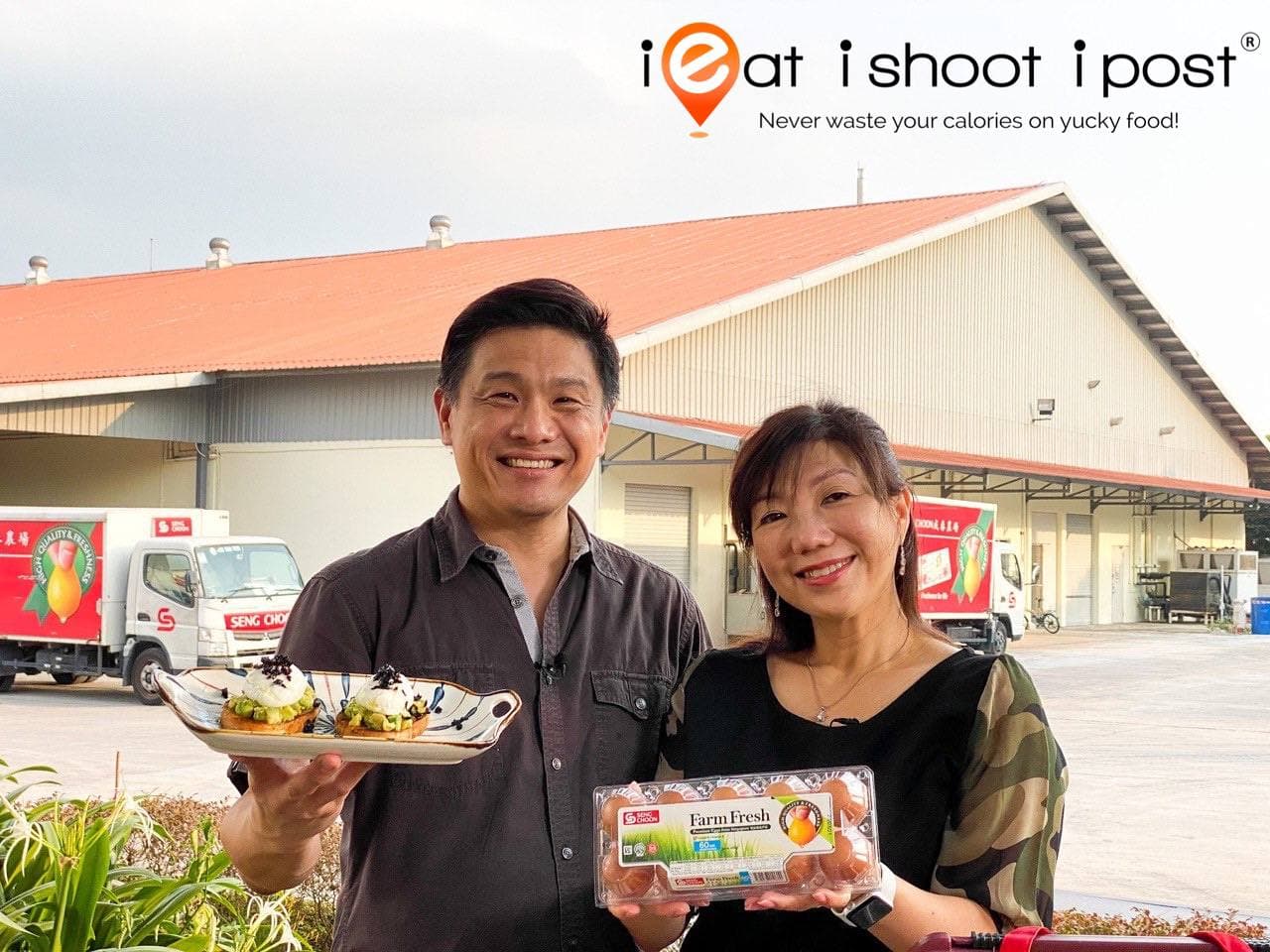

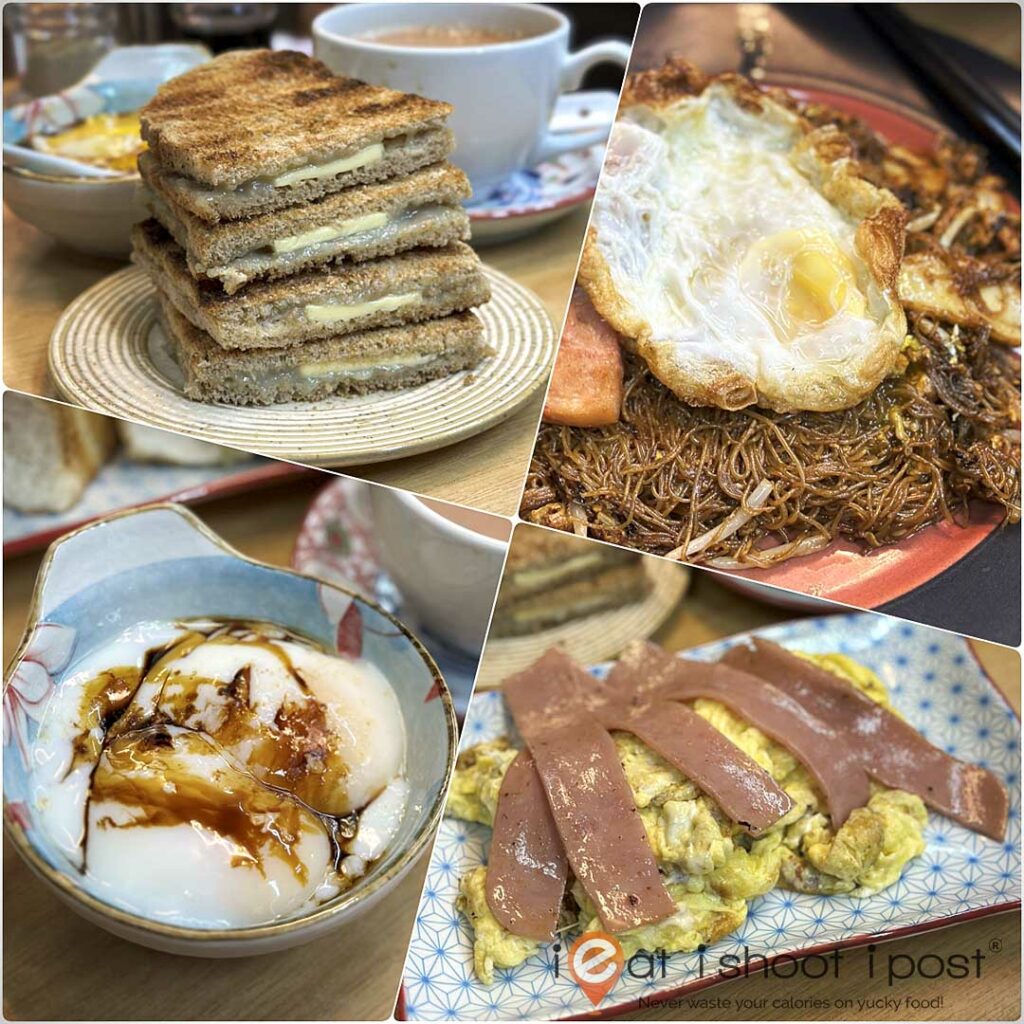
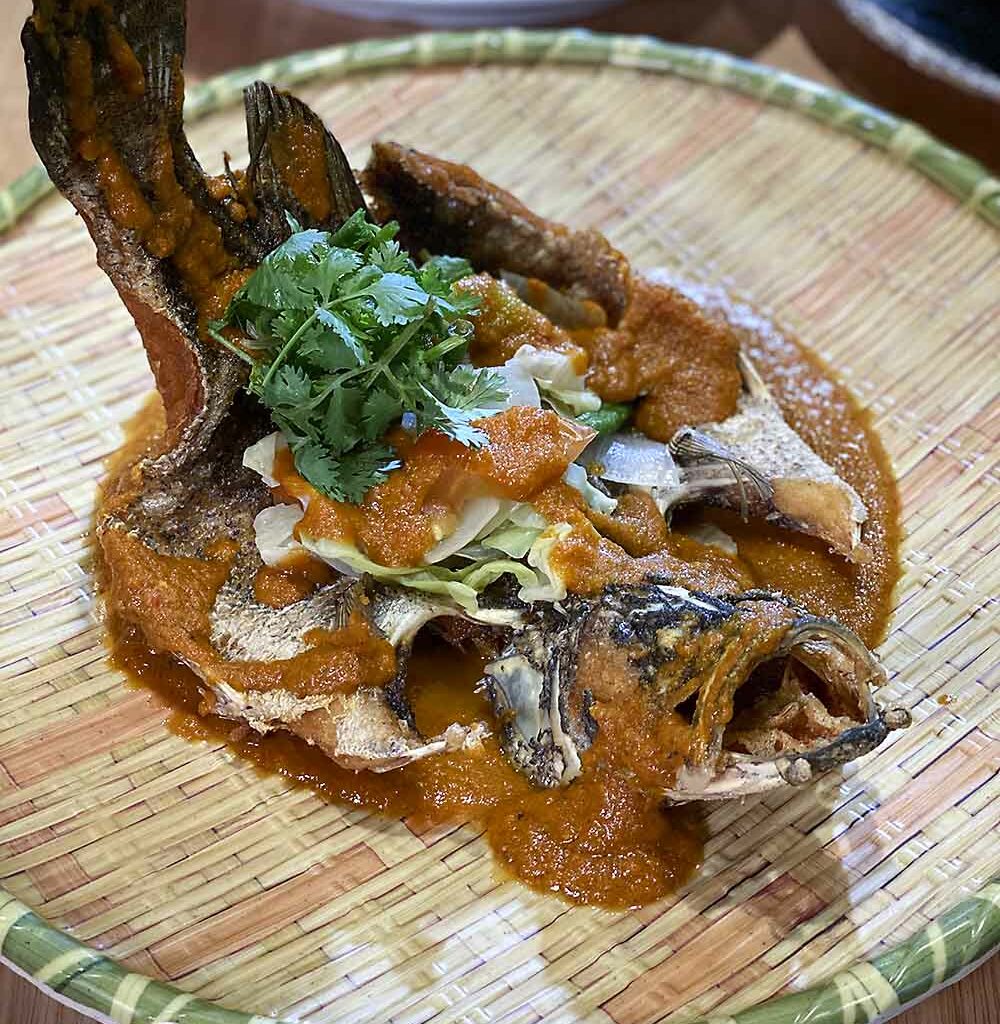
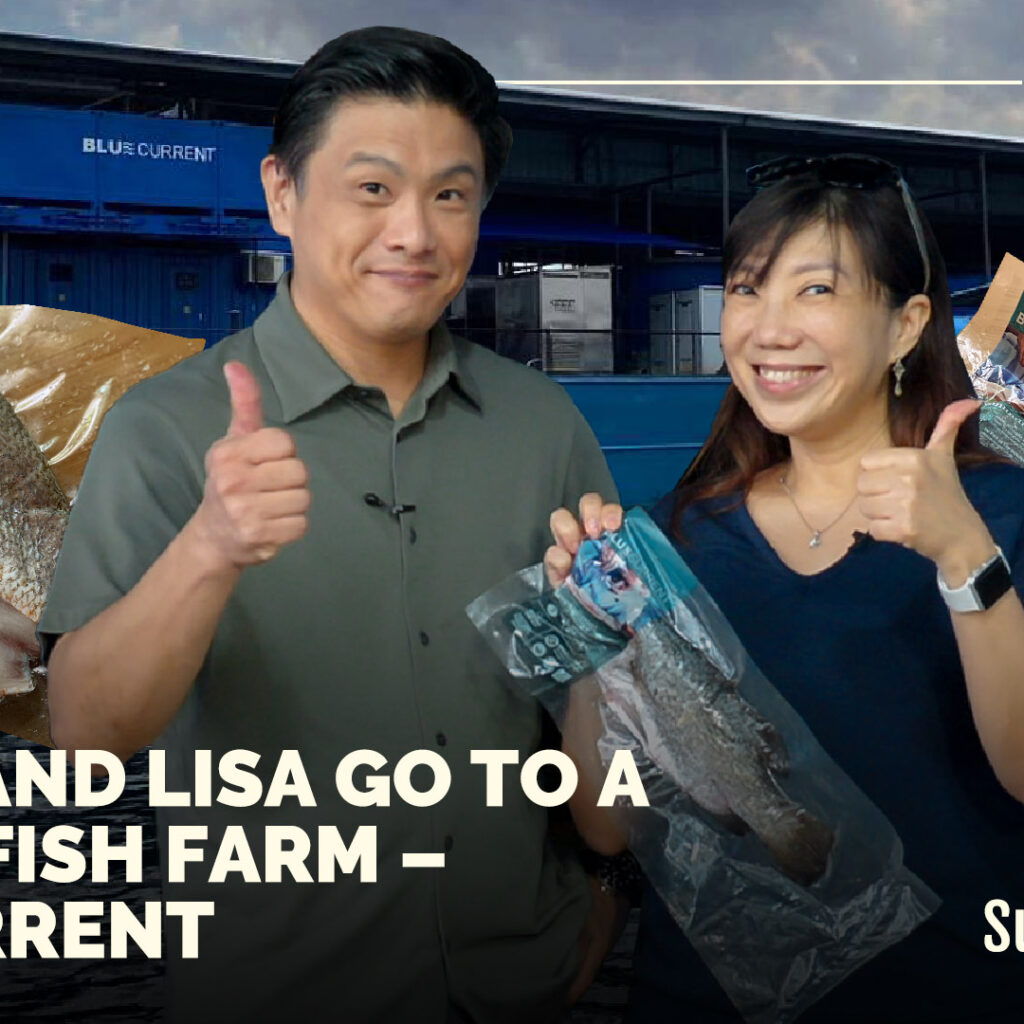
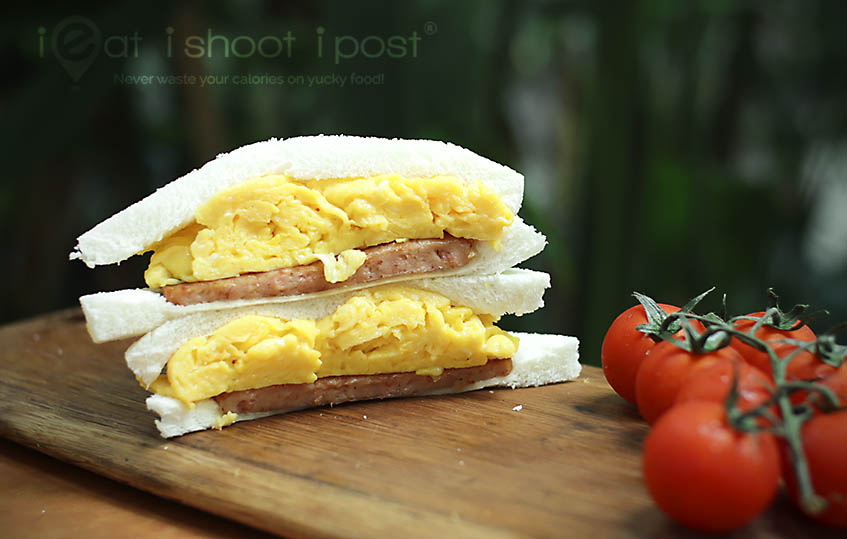
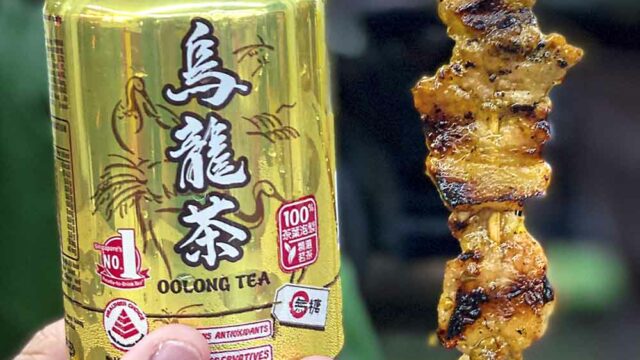
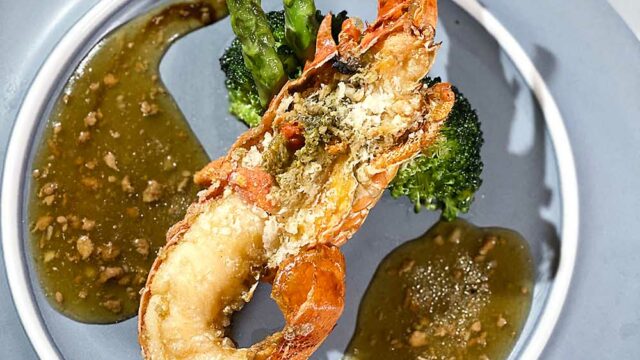

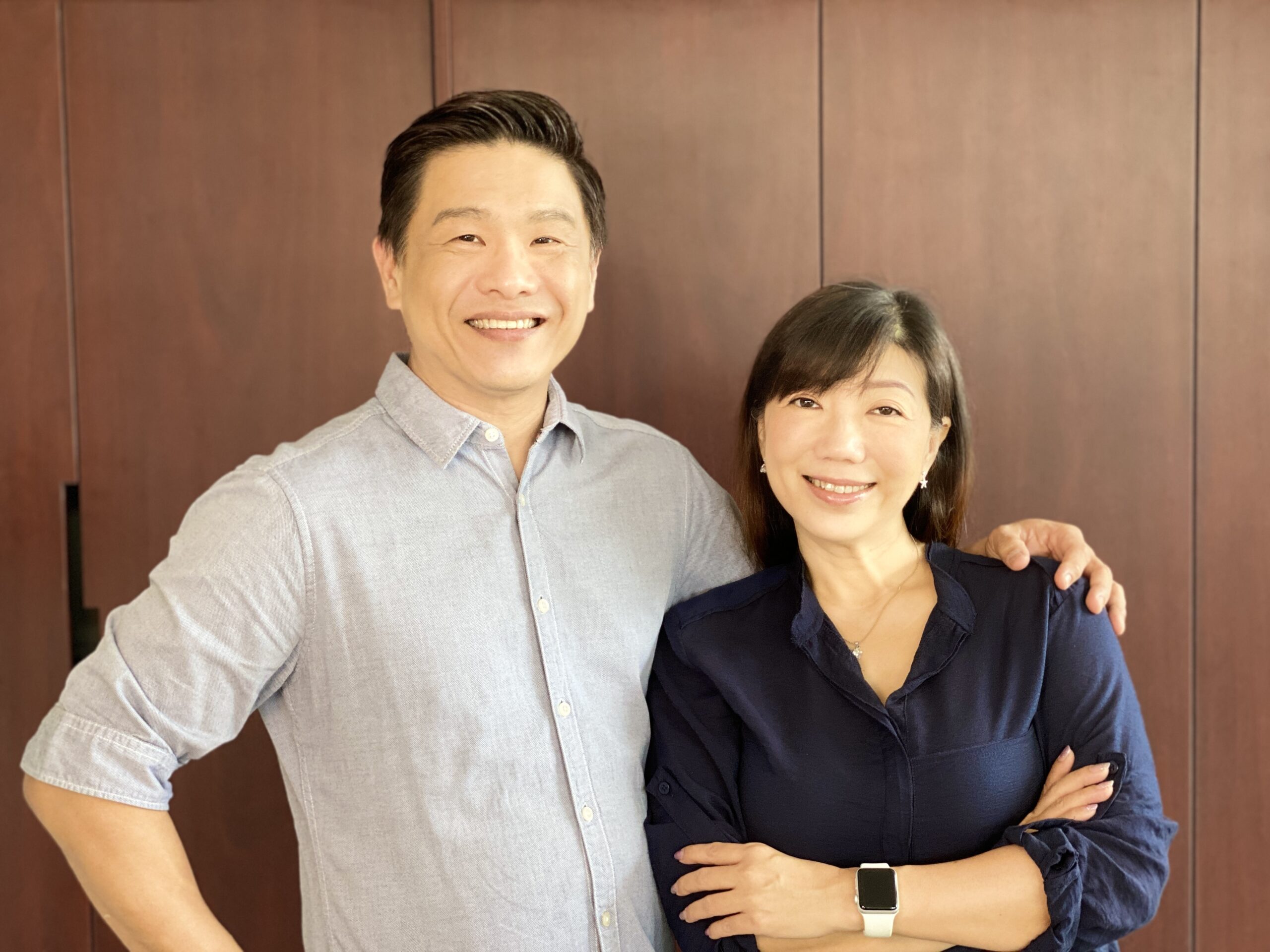
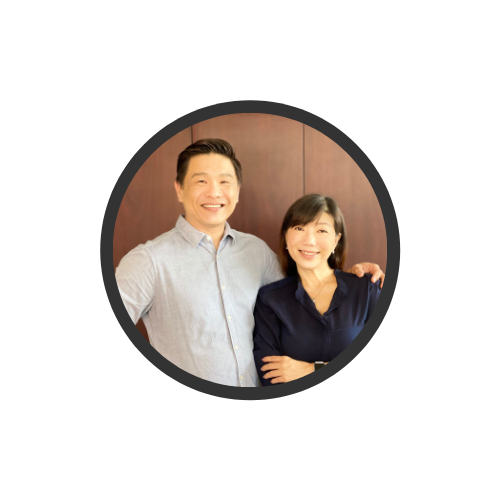
Hi Dr. Tay,
Thanks for sharing!
Keen to try your recipe! How do you prepare the Shio Kombu? The product link you shared on Lazada looks quite firm, but it looks soft and moist in your final product which you sprinkled on the poached eggs.
It’s the same product. The Shio Konbu shown in the video and photo has been in the fridge for a while that’s all. 🙂
Thanks for sharing! 🙂
Update is knowledgeable